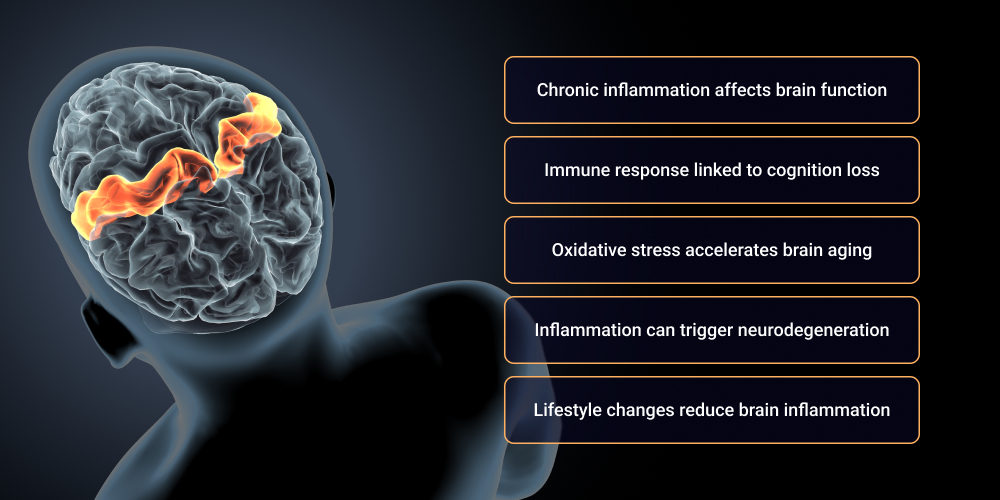Inflammation is something we all experience from time to time. Think of a swollen ankle after a twist or redness around a cut. But when inflammation stays for too long, it becomes chronic inflammation. It is a condition that quietly damages our bodies, especially the brain. Unlike short-term inflammation that heals injuries, chronic inflammation is a slow burn. Deep down, it’s subtly changing how our brain works in the long run.
This ongoing inflammation plays a big role in how well our brains perform daily tasks, a concept known as brain function. When it doesn’t stop, it can lead to serious issues like cognitive decline. There, memory, focus, and thinking skills start to fail. More seriously, it’s tied to neurodegeneration, the gradual breakdown of brain cells that can result in diseases like Alzheimer’s. Scientists now see chronic inflammation as a key player in these problems. It makes it a critical target for keeping our minds sharp.
Why does this matter? Because our mental health – how we feel, think, and cope – depends on a healthy brain. When chronic inflammation interferes with brain function, it doesn’t just affect memory or focus. It can also impact our mood and overall well-being. Addressing this silent troublemaker isn’t just about preventing disease. It’s about protecting the quality of our lives as we age.
The Link Between Chronic Inflammation and Cognitive Decline
So how exactly does chronic inflammation lead to cognitive decline? It starts with the brain’s delicate balance. Normally, inflammation is a protective response. Your body’s way of fighting off infections or healing damage. But when it becomes chronic, it turns into a problem that messes with brain function.
The process works like this: persistent inflammation floods the brain with chemicals. These chemicals, called cytokines, are released by the body’s immune response. These chemicals are helpful in small doses; however, when there are too many of them, they disrupt communication between brain cells. This interference can:
- Slow down thinking
- Make it harder to remember things
- Even cloud decision-making
Over time, these changes show up as cognitive decline. A person may face troubles with memory, difficulty concentrating, or forgetting tasks.
Symptoms of this decline might include losing one’s train of thought often, struggling to learn new skills, or feeling mentally foggy. Research shows that chronic inflammation doesn’t just stop at mild symptoms. It’s the first stage before bigger issues like neurodegeneration. The immune response, meant to protect us, becomes overactive. It attacks healthy brain tissue instead. That’s why understanding this link is so important. It’s not just about aging; it’s about how inflammation chips away at our mental sharpness over time.
How Chronic Inflammation Triggers Neurodegeneration
When chronic inflammation lingers, it doesn’t just mess with daily thinking. It sets the stage for neurodegeneration, the slow destruction of brain cells. This isn’t a quick process. It’s a gradual breakdown that can lead to serious conditions like Alzheimer’s or Parkinson’s disease.
Here’s how it happens: the immune response that’s constantly “on” releases a barrage of harmful substances. It includes those cytokines we mentioned earlier. These substances start attacking neurons — the brain’s building blocks — causing damage that builds up over years. Imagine it like rust eating away at metal: at first, it’s just a spot, but over time, it weakens the whole structure. That’s what chronic inflammation does to the brain.
This prolonged attack also creates a toxic environment where brain cells can’t repair themselves fast enough. Proteins might start clumping together abnormally (like amyloid plaques in Alzheimer’s), or nerve connections might break down (like in Parkinson’s). Studies show that people with long-term inflammation — such as from conditions like arthritis or diabetes — are at higher risk for these neurodegenerative diseases. It’s a clear sign that keeping inflammation in check isn’t just about feeling better today. It’s about protecting your brain for tomorrow.
The Role of Oxidative Stress in Brain Function and Decline
Another piece of this puzzle is oxidative stress. It is a side effect of chronic inflammation that significantly impacts the brain. Think of it like this: when inflammation keeps the immune system in overdrive, it produces free radicals. They are unstable molecules that react with and damage cells. This imbalance between free radicals and the body’s ability to neutralize them is what we call oxidative stress.
In the brain, this damage targets neurons and other cells critical for brain function. Oxidative stress acts like an accelerator for aging. This process wears down brain tissue faster than it should. Over time, this wear and tear contributes to cognitive decline. It makes it more difficult to think clearly or remember details. It’s also a key player in the early stages of neurodegeneration. It sets the scene for bigger problems in the future.
For example, oxidative stress can harm the mitochondria. These are the powerhouses inside cells. It can leave neurons without the energy they need to work properly. Research links this process to memory loss and slower processing speeds. By understanding how oxidative stress ties into inflammation, we see why fighting both is so crucial for keeping our brains healthy as we age.
Immune Response and Chronic Inflammation: The Brain’s Silent Enemy
Let’s zoom in on the immune response – the body’s defense system – and how it becomes a double-edged sword in chronic inflammation. Normally, this system starts working to fight off germs or heal injuries. Then, it calms down when the job’s done. But with chronic inflammation, it’s like the immune system forgets to turn off. This constant activity creates a harmful inflammatory environment in the brain. It quietly damages brain function and mental health.
When the immune system stays active too long, it floods the brain with inflammatory molecules. These molecules, like cytokines and chemokines, create an environment where brain cells struggle to communicate. Over months or years, this can lead to conditions like depression, anxiety, or even dementia. It shows how closely mental health is tied to inflammation. For instance, studies have found higher inflammation levels in people with mood disorders. It suggests it’s not just a physical issue but an emotional one too.
Take multiple sclerosis as another example. Chronic inflammation attacks the protective coating around nerves. It impairs brain function and causes symptoms like fatigue and memory problems. In these cases, the immune response isn’t protecting the brain – it’s silently tearing it apart. Recognizing this connection helps us see why managing inflammation isn’t just about physical health. It’s about keeping our minds strong and stable.
Addressing Chronic Inflammation for Better Brain Health
The good news? We’re not powerless against chronic inflammation and its effects on brain function. There are practical steps we can take to lower it and protect our cognitive health. It starts with lifestyle changes – things we can control every day.
First, diet plays a huge role. Foods rich in antioxidants – like berries, nuts, and leafy greens – can fight oxidative stress and reduce inflammation. Cutting back on processed sugars and unhealthy fats, like those in fast food, helps too. Research shows that a Mediterranean-style diet, full of fish, olive oil, and veggies, can lower inflammation markers and support brain health.
Exercise is another big win. Just 30 minutes of walking, swimming, or yoga most days can calm the immune response and boost blood flow to the brain. It doesn’t have to be intense – consistency matters more. Sleep is important too. Poor rest leads to inflammation, while 7-8 hours a night helps the brain recover.
For some, medical help might be needed. Doctors can prescribe anti-inflammatory drugs or suggest supplements like omega-3s, which studies link to better cognitive outcomes. The key is catching inflammation early — before it fuels cognitive decline or neurodegeneration. Regular check-ups and blood tests can spot trouble at an early stage. It gives you a head start on protecting your brain.
The Future of Managing Chronic Inflammation and Cognitive Decline
Looking ahead, the fight against chronic inflammation and its impact on brain function is picking up speed. Scientists are digging deeper into how inflammation drives cognitive decline and neurodegeneration. And the future looks promising. With every study, we’re getting closer to better ways to prevent and treat these issues.
One exciting area is personalized medicine. Researchers are exploring how our genes affect inflammation and brain health. It could lead to tailored treatments – like drugs that target specific inflammatory pathways. New technologies are also helping doctors spot inflammation early, before it turns into bigger problems. For example, brain imaging.
Prevention is getting attention too. Public health campaigns are spreading the word about lifestyle habits that hold back inflammation, such as diet, exercise, and stress management. Meanwhile, anti-inflammatory supplements or even brain-boosting therapies (think electrical stimulation) are in the works. Some studies suggest that tackling oxidative stress with antioxidants could slow brain aging. It offers hope for longer, sharper lives.
The growing awareness of inflammation’s role means more people are taking action early. As neuroscience advances, we might see a future where cognitive decline isn’t an inevitable part of aging – but a challenge we can outsmart.













I've given up... the stress her office staff has put me through is just not worth it. You can do so much better, please clean house, either change out your office staff, or find a way for them to be more efficient please. You have to do something. This is not how you want to run your practice. It leaves a very bad impression on your business.
Please, leave your review
Write a comment: